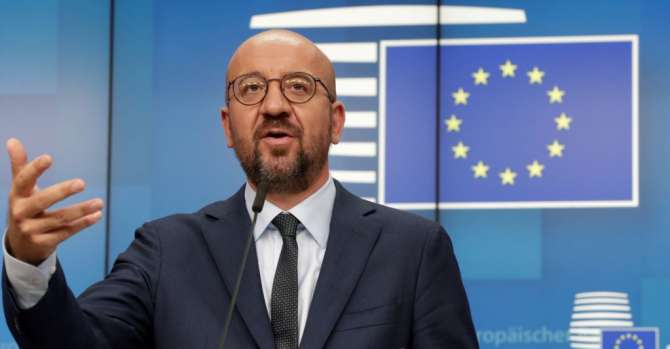EU Summit Delay Postpones Belarus Sanctions Debate
Rferl
23 September 2020, 13:55
 A summit of European Union leaders slated for later this week in Brussels has been postponed for a week so that European Council President Charles Michel can go into quarantine after a security guard tested positive for the coronavirus.
A summit of European Union leaders slated for later this week in Brussels has been postponed for a week so that European Council President Charles Michel can go into quarantine after a security guard tested positive for the coronavirus.
The bloc's 27 leaders will instead gather on October 1 and 2, officials said.
Michel "today learned that a security officer, with whom he was in close contact early last week, tested positive for COVID," spokesman Barend Leyts said on September 22.
EU leaders and ministers have resumed in-person meetings under physical-distancing rules, but EU officials still abide by Belgium's lockdown rules imposed to battle the spread of the coronavirus.
The planned meeting is expected to include debate over possible EU sanctions against Belarus over five-term President Alyaksandr Lukashenka's disputed reelection and authorities' crackdown on opposition leaders demanding his resignation and a new vote.
Foreign ministers have reportedly been unable to agree on a list of Belarusian sanctions due to objections from Cyprus, which wants to link those actions to its unrelated dispute with Turkey over gas exploration in the eastern Mediterranean.
"Although there is a clear will to adopt these [Belarus] sanctions, it has not been possible to do that today because the required unanimity was not reached," EU foreign policy chief Josep Borrell told reporters after hosting talks on September 21.
Unanimity is required in such cases, and even countries like France that sympathize with Cyprus have reportedly been urging Nicosia to decouple the Belarusian and Turkish issues.
"It is regrettable that today we could not decide on sanctions on violations of human rights there due to 'a hostage taking' by a member state," Latvian Foreign Minister Edgars Rinkevics wrote on Twitter.
The EU vowed three weeks ago to impose sanctions on Belarusian officials whom the bloc blames for abuses against ongoing protests and electoral fraud that gave authoritarian Lukashenka a landslide victory in the country's August 9 election.
So far, the bloc has put together a list of about 40 people it could sanction with asset freezes and travel bans in response to the crackdown.
Belarusian opposition leader Svyatlana Tsikhanouskaya, who met EU foreign ministers in Brussels earlier this week, has pressed the bloc to be “more brave” in its action as she showed them pictures of mass protests and police beatings.
Tsikhanouskaya told reporters that sanctions are a key tool to "force the so-called authorities to start dialogue with us” and that the EU should not recognize Lukashenka’s legitimacy.
The bloc reportedly has not yet agreed whether any sanctions list should include Lukashenka, who has repressed the opposition and independent news media during 26 years in power and refuses to talk with the protesters.
The deferred gathering of EU leaders in Brussels will also focus on relations with Turkey, which have deteriorated in recent months due to the dispute with Greece and Cyprus about recent Turkish gas exploration in seas claimed by Nicosia.
23 September 2020, 13:55

European Council President Charles Michel
The bloc's 27 leaders will instead gather on October 1 and 2, officials said.
Michel "today learned that a security officer, with whom he was in close contact early last week, tested positive for COVID," spokesman Barend Leyts said on September 22.
EU leaders and ministers have resumed in-person meetings under physical-distancing rules, but EU officials still abide by Belgium's lockdown rules imposed to battle the spread of the coronavirus.
The planned meeting is expected to include debate over possible EU sanctions against Belarus over five-term President Alyaksandr Lukashenka's disputed reelection and authorities' crackdown on opposition leaders demanding his resignation and a new vote.
Foreign ministers have reportedly been unable to agree on a list of Belarusian sanctions due to objections from Cyprus, which wants to link those actions to its unrelated dispute with Turkey over gas exploration in the eastern Mediterranean.
"Although there is a clear will to adopt these [Belarus] sanctions, it has not been possible to do that today because the required unanimity was not reached," EU foreign policy chief Josep Borrell told reporters after hosting talks on September 21.
Unanimity is required in such cases, and even countries like France that sympathize with Cyprus have reportedly been urging Nicosia to decouple the Belarusian and Turkish issues.
"It is regrettable that today we could not decide on sanctions on violations of human rights there due to 'a hostage taking' by a member state," Latvian Foreign Minister Edgars Rinkevics wrote on Twitter.
The EU vowed three weeks ago to impose sanctions on Belarusian officials whom the bloc blames for abuses against ongoing protests and electoral fraud that gave authoritarian Lukashenka a landslide victory in the country's August 9 election.
So far, the bloc has put together a list of about 40 people it could sanction with asset freezes and travel bans in response to the crackdown.
Belarusian opposition leader Svyatlana Tsikhanouskaya, who met EU foreign ministers in Brussels earlier this week, has pressed the bloc to be “more brave” in its action as she showed them pictures of mass protests and police beatings.
Tsikhanouskaya told reporters that sanctions are a key tool to "force the so-called authorities to start dialogue with us” and that the EU should not recognize Lukashenka’s legitimacy.
The bloc reportedly has not yet agreed whether any sanctions list should include Lukashenka, who has repressed the opposition and independent news media during 26 years in power and refuses to talk with the protesters.
The deferred gathering of EU leaders in Brussels will also focus on relations with Turkey, which have deteriorated in recent months due to the dispute with Greece and Cyprus about recent Turkish gas exploration in seas claimed by Nicosia.

